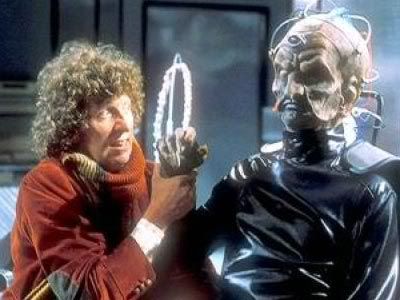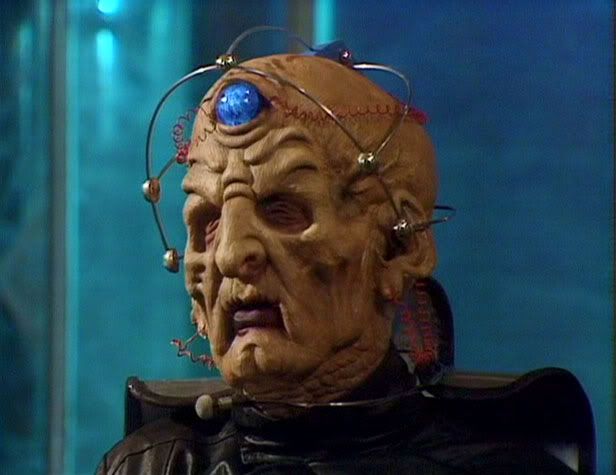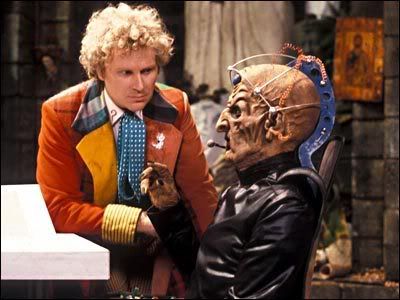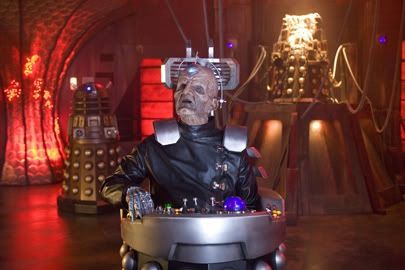Davros
Davros was first seen in Genesis of the Daleks (Classic series) as a genius. Mad though he may be and as evil as they come, he is still a genius. Davros was a scientist on the planet Skaro during the thousand year war between the Kaleds and the Thals. He was at first fighting in the war, until he was injured and resigned to a wheelchair, one that he designed himself. The wheelchair is very similar in design to that of the bottom half of a Dalek. During the war on Skaro, Davros was the head of the Scientific Core, and he realised what his people would become after the radiation affected them. So he built, as he had built for himself, a life support machine that would be able to fight ruthlessly and without mercy. But he could not wait long enough for his people (the Kaleds) to become the mutants to go into his machine, so he made his own. He removed its emotions, its compassion and mercy. He created a Dalek Mutant, and once he put it inside his machine (which was a Dalek machine), he named it a Dalek as an anagram of his people, the Kaleds.
Davros created the Daleks to be the superior race, the rulers of the universe and to think that they were above everything and everyone else. But he did this too well, and when he came to command them after their creation, they refused to listen to his orders, saying that they were more supreme than him. He realised his mistake, and realised that The Doctor had been telling the truth, and went to press a button that would ultimately destroy all of the Daleks he had made. But the Daleks did not want this, and they exterminated their creator.

The Daleks spread far and wide across the universe, leaving a dead Davros buried in the Kaled city, rotting. Until they got into a war with the Movellans. The Daleks, although mutants inside their casings, used robotics for their war systems. This worked effectively against organic life-forms, but not fellow robots the Movellans. The Movellans also used computers to work out their battle strategies, out thinking their opponents. Until they met the Daleks, and the two war computers had an impasse. They would out think the other move fast enough, that neither side looked like winning, so the Daleks went back to resurrect their creator so he could programme their computer with logic. It was said that he had survived through his life support system. When the main part had gone down from the extermination in Genesis of the Daleks, the back-up system had kicked in. But The Doctor got in the way again, capturing Davros and freezing him for imprisonment. The Movellans had first wanted the Doctor to get them out of their impasse, but he had refused.

Far into the future, Davros was onboard a prison ship, still frozen when the Daleks required his help once more. After freeing him, he asked about their war with the Movellans. They had lost, due to a Movellan virus that only affected Daleks, and Davros was needed to make a cure. He agreed, but he had a different motive - to kill all of the Daleks, and make them again but so that they would follow his command. But the Daleks got wise to his plan, and stopped him, so he released more Movellan virus on the Daleks sent to exterminate him and they died. But Davros must be part Dalek, for the virus affected him as well, and killed him.
The next time Davros showed up, the Doctor was into his fifth regeneration (Sixth Doctor), and he was running a funeral parlor. He was attempting to create new Daleks that would take on the first Daleks. But the original Daleks got wind of this plan, and came to get Davros. When Davros tried to make out that the Doctor should be taken because he was the sworn enemy of the Daleks, they refused, saying that he was not in their memory banks (this was the Sixth Doctor's first encounter with the Daleks), so they took Davros. The final time Davros was seen in the Classic series was in the Seventh Doctor episode, Rememberance of the Daleks, in which two Dalek factions (Imperials and Renegades), controlled by the Supreme Dalek and the Emperor Dalek, were after Time-Lord technology. But the Emperor Dalek turned out to be Davros, having finally created his new Daleks, but the Doctor destroyed the ship he was on. The ship blew up, but Davros ejected before the ship was hit by the Hand of Omega that destroyed it. It was mentioned in The Stolen Earth (Series 4 : Episode 12) and Journey’s End (Series 4 : Episode 13) that Davros had fought in the Time War against the Time Lords. It is revealed that Davros was thought to have died in the first year of the Time War after flying his command ship into the jaws of the Nightmare Child, despite the Doctor’s efforts to save him.

Davros returned at the end of series four with a new plan to take over the universe, and new Daleks. It is revealed that Dalek Caan had managed to go back in time to the time-war (which is time locked) and rescued Davros, even though it cost him his sanity. Davros created his new army of Daleks using cells from his own body. He reveals his torso to the Doctor, which has very little flesh and skin left, you can see his rib cage and internal organs. His plan this time was to put a lot of planets, one second out of sync with the rest of time in the Medusa Cascade and unleash the Reality Bomb that cancelled out the electrical field binding atoms to reduce the whole of creation to nothing except for the Daleks and Davros safe inside the Crucible ship. Davros was again overthrown by his new creation of Daleks and forced to live in the vault as their scientific advisor, though all of them were betrayed by Dalek Caan, who, thanks to his newfound prophetic abilities (as a result of going into the time locked Time War), saw what the Daleks were and realised that the Doctor was right and set about helping draw the Doctor to the Crucible to stop them. Davros was not seen to be killed in the episode, though it is assumed he died in the destruction of the Crucible, he has been known to survive death before, such as his own extermination.